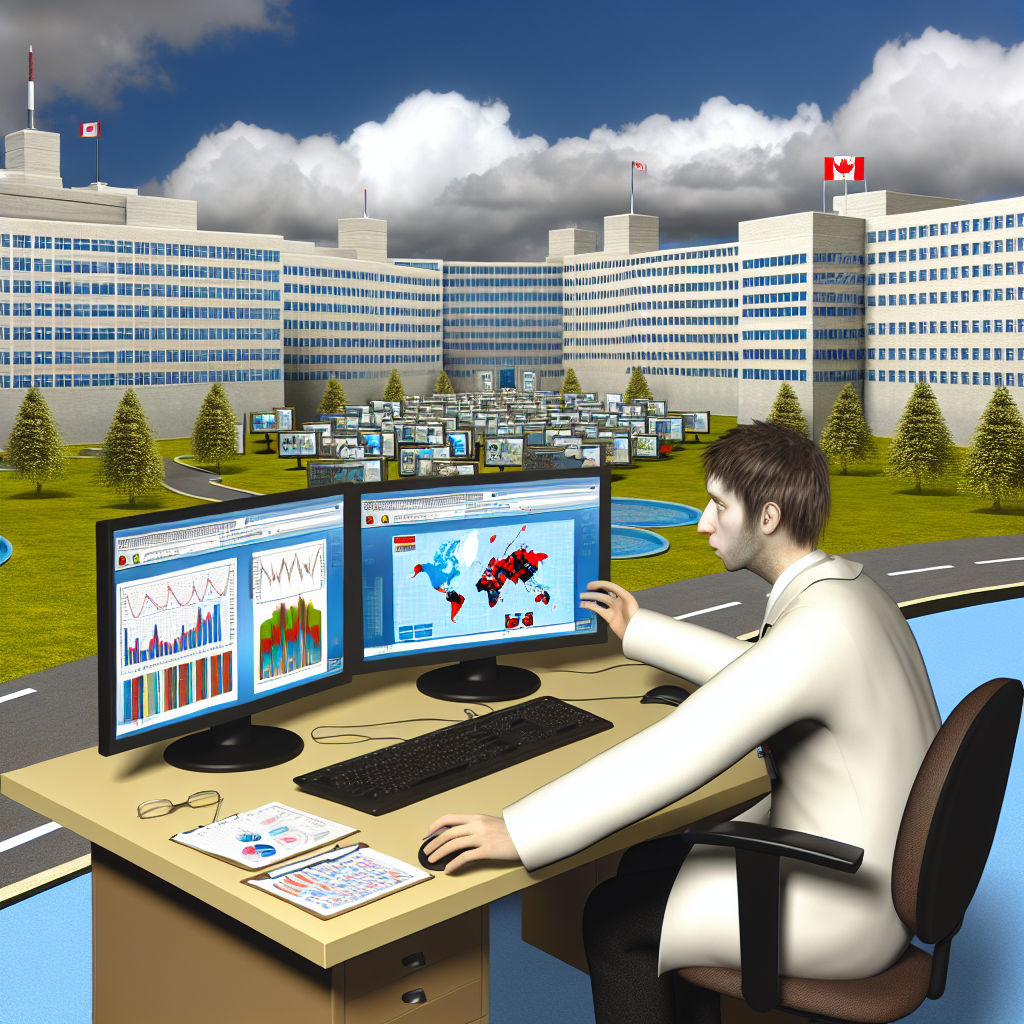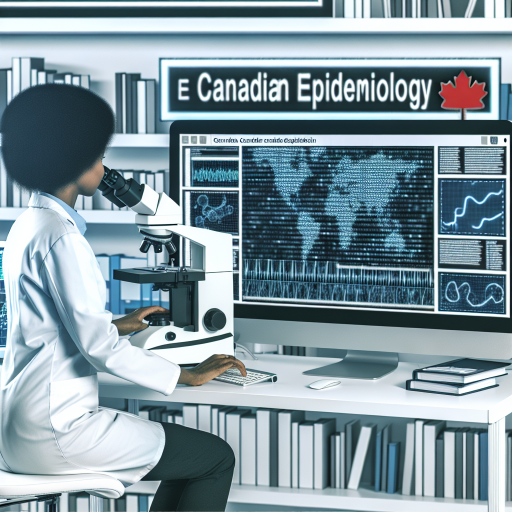Introduction to Epidemiology
Epidemiology plays a crucial role in understanding health impacts in populations.
It studies how diseases spread and the factors affecting their distribution.
The discipline focuses on patterns and causes of health issues.
Moreover, it informs public health decisions and policies.
Defining Epidemiologists
Epidemiologists are public health professionals specializing in disease research.
They apply scientific methods to gather and analyze health data.
For instance, they assess risks and help control disease outbreaks.
Also, they contribute to developing strategies for disease prevention.
Their insights drive effective interventions and health programs.
Contributions of Epidemiologists
Epidemiologists provide vital information for healthcare systems.
They analyze trends to understand disease prevalence over time.
Through extensive research, they identify high-risk populations.
Consequently, they can tailor public health initiatives effectively.
Their work enhances vaccination strategies and health education campaigns.
Role of Epidemiologists in Healthcare
Epidemiologists significantly influence healthcare policies and practices.
They collect data that drives evidence-based decision-making.
Furthermore, their research supports the development of healthcare protocols.
For example, during an outbreak, they guide containment measures.
Collaborating with Public Health Officials
Epidemiologists often collaborate with various health agencies.
They work with organizations like the CDC and WHO on health initiatives.
This collaboration ensures coordinated responses to health crises.
Additionally, they help in training healthcare providers.
Enhancing Disease Surveillance Systems
They enhance disease surveillance systems for better monitoring.
Through data analysis, they identify emerging health threats.
Their findings prompt timely public health responses.
Unlock Your Career Potential
Visualize a clear path to success with our tailored Career Consulting service. Personalized insights in just 1-3 days.
Get StartedConsequently, healthcare systems can allocate resources efficiently.
Ultimately, this proactive approach saves lives.
Historical Overview of Epidemiology and Its Impact on Health Practices
Origins of Epidemiology
Epidemiology traces its roots back to ancient civilizations.
The Greeks utilized observations to understand disease patterns.
Notably, Hippocrates introduced concepts of disease causation.
His work laid the foundation for modern public health.
Development Through the Centuries
In the 17th century, John Graunt pioneered the use of statistics.
He analyzed mortality records to track patterns of disease.
This marked a significant advancement in epidemiological methods.
During the 19th century, Edwin Chadwick focused on sanitation.
His reports highlighted the link between living conditions and health.
Impact on Public Health Practices
Epidemiologists play a critical role in informing public health policies.
They investigate outbreaks and identify disease origins.
Effective responses to health crises rely on their expertise.
For instance, the control of cholera outbreaks demonstrated this impact.
The implementation of sanitation practices proved effective and necessary.
Advancements in Modern Epidemiology
The 20th century saw advancements in epidemiological techniques.
These techniques include cohort and case-control studies.
Technological advancements have also enhanced disease tracking.
For example, data analytics and geographic information systems help identify hotspots.
Challenges and Future Directions
Today, epidemiologists face new public health challenges.
Emerging diseases, such as COVID-19, require swift investigation.
Furthermore, addressing health disparities remains a priority.
Future research will focus on improving health equity and access.
Collaboration among disciplines will enhance epidemiological efforts.
Key Contributions of Epidemiologists to Disease Prevention and Control
Role in Surveillance and Data Collection
Epidemiologists play a crucial role in disease surveillance.
They collect data to identify disease patterns effectively.
This data informs public health decisions and policies.
Furthermore, they monitor outbreaks to implement timely interventions.
Development of Public Health Policies
Epidemiologists provide evidence for public health policies.
Their research supports the development of guidelines.
They advise on vaccination programs and health campaigns.
Ultimately, their work fosters healthier communities.
Education and Training
Epidemiologists contribute to education and training initiatives.
They teach healthcare professionals about disease prevention.
This training enhances the skills of public health workers.
In turn, it empowers communities to respond effectively to health crises.
Research and Innovation
Research is a fundamental aspect of epidemiology.
Epidemiologists conduct studies to explore disease causes.
They contribute to advancements in treatment and prevention methods.
Innovative solutions often emerge from their findings.
Collaboration with Other Disciplines
Epidemiologists frequently collaborate with various professionals.
They work alongside healthcare providers, policymakers, and researchers.
This interdisciplinary approach enhances overall health outcomes.
Additionally, it allows for a comprehensive understanding of public health issues.
See Related Content: Exploring Geologist Job Opportunities in Canada
Impact of Epidemiologists on Healthcare Systems
Epidemiologists in Public Health Policy Development
Epidemiologists play a crucial role in shaping public health policies.
They analyze data to identify health trends and issues.
This analysis provides essential information for decision-makers.
Furthermore, their expertise guides the development of effective health programs.
They work with governments to create evidence-based policies.
For example, epidemiologists often assess the impact of vaccination programs.
This assessment helps in allocating resources effectively.
Moreover, they contribute to health legislation that protects communities.
Response Strategies During Health Crises
Epidemiologists lead response strategies during health emergencies.
They assess the outbreak’s spread and impact on populations.
Additionally, they recommend appropriate intervention measures.
For instance, during the COVID-19 pandemic, epidemiologists guided testing and contact tracing efforts.
They also advised on public health guidelines aimed at reducing transmission.
This guidance proved vital in managing health systems’ responses.
Subsequently, their data-driven approach helped inform the public.
Collaboration with Other Healthcare Professionals
Collaboration is key to the success of epidemiologists’ efforts.
They work closely with healthcare providers, policymakers, and researchers.
This teamwork enhances the overall understanding of health threats.
Furthermore, interdisciplinary collaboration leads to more comprehensive solutions.
Epidemiologists often engage with community organizations as well.
This engagement helps address public concerns and improve health literacy.
Ultimately, these collaborations foster a united front against health issues.
Role in Advocacy and Education
Epidemiologists advocate for public health initiatives and funding.
Their expertise lends credibility to health campaigns.
Moreover, they educate both the public and healthcare professionals.
This education raises awareness about preventive measures.
For example, they train healthcare workers on disease surveillance.
Likewise, they inform communities about health risks and prevention strategies.
As a result, they empower individuals to make informed health choices.
Uncover the Details: Epidemiology and Its Role in Public Health Crises
The Role of Epidemiologists during Outbreaks and Epidemics
Identifying Disease Patterns
Epidemiologists play a crucial role in identifying disease patterns during outbreaks.
They collect data to understand how diseases spread.
By analyzing this information, they detect potential hotspots.
This data-driven approach allows for timely interventions.
Implementing Surveillance Systems
Surveillance systems are essential for monitoring public health threats.
Epidemiologists design these systems to track infections effectively.
They collaborate with health agencies to ensure comprehensive coverage.
This proactive monitoring helps in responding to emerging threats.
Guiding Public Health Policy
Epidemiologists provide critical insights for public health policy decisions.
They produce reports that inform government agencies on health risks.
Their expertise shapes health guidelines and response strategies.
This expert advice is crucial during public health emergencies.
Coordinating Response Efforts
During an outbreak, coordination is vital for effective responses.
Epidemiologists work with various stakeholders to align efforts.
This includes healthcare providers, policymakers, and community organizations.
Such collaboration enhances the overall effectiveness of response strategies.
Educating the Public
Public education is another key function of epidemiologists.
They develop materials to raise awareness about the disease.
By educating the public, they promote preventive measures.
This helps reduce the spread of infections within communities.
Evaluating Intervention Strategies
After implementing health interventions, evaluation is crucial.
Epidemiologists assess the effectiveness of these strategies.
Their evaluations guide future public health initiatives.
This continual process improves the response to future outbreaks.
Discover More: Canadian Universities Offering Geology Programs
Epidemiologists and their Influence on Health Education and Community Awareness
Role of Epidemiologists in Health Education
Epidemiologists serve as key educators in public health initiatives.
They disseminate vital information about disease prevention and health promotion.
Moreover, their research underpins educational material used across healthcare settings.
They collaborate with health organizations to develop training programs for healthcare workers.
These professionals also share their findings through workshops and seminars.
Consequently, they empower communities to take proactive health measures.
Enhancing Community Awareness
Community awareness is critical in controlling disease outbreaks.
Epidemiologists contribute significantly by analyzing disease patterns in populations.
They communicate risks associated with health threats to the general public.
Through public campaigns, they raise awareness about vaccination and screenings.
Their efforts help demystify complex health data for everyday understanding.
As a result, communities become more engaged in their health decisions.
Case Studies and Impact
Numerous case studies highlight the impact of epidemiologists.
For example, during the COVID-19 pandemic, they provided crucial insights into transmission dynamics.
These insights shaped public health policies and community responses.
Additionally, their advisory roles in local health departments fostered community cooperation.
Such collaborative efforts have proven effective in managing public health crises.
Ultimately, their continuous involvement enhances overall health outcomes.
Future Directions in Health Education
Looking ahead, integrating technology in health education is essential.
Epidemiologists can leverage digital platforms to broaden their reach.
Through social media and mobile apps, they can disseminate real-time information.
Furthermore, utilizing data analytics will enable targeted health interventions.
Such advancements ensure that health education remains relevant and impactful.
Consequently, the ongoing work of epidemiologists will continue to transform community health awareness.
Gain More Insights: Marine Biology Careers in Canada: Exploring Oceans and Aquatic Ecosystems

Collaborative Efforts between Epidemiologists and Other Healthcare Professionals
The Role of Epidemiologists
Epidemiologists play a crucial role in public health.
They analyze data to identify health trends and outbreaks.
This information aids in disease prevention and control.
Partnerships with Public Health Officials
Epidemiologists collaborate with public health officials regularly.
They work together to develop effective health policies.
These partnerships enhance community health responses.
For example, during outbreaks, they create containment strategies.
Collaboration with Healthcare Providers
Epidemiologists also team up with healthcare providers.
This collaboration ensures accurate disease reporting.
It helps providers understand emerging health threats.
In addition, they aid in case management and treatment protocols.
Engagement with Researchers and Academics
Research collaboration is another vital aspect.
Epidemiologists often partner with academic researchers.
The goal is to conduct studies that inform public health strategies.
These studies contribute to evidence-based practices.
Community Involvement
Community engagement is essential for epidemiologists.
They often conduct outreach programs to educate the public.
Moreover, they gather feedback to enhance health initiatives.
This two-way communication fosters trust and cooperation.
Impact on Health Policies
Epidemiologists significantly influence health policies.
Their data-driven insights guide decision-making processes.
Consequently, this leads to improved health outcomes for communities.
Training and Education
Training new epidemiologists is crucial for sustainability.
Current professionals provide mentorship and guidance.
This ensures a continuous flow of knowledge and expertise.
As a result, healthcare systems remain robust and responsive.
Challenges Faced by Epidemiologists in Modern Healthcare Systems
Data Collection and Analysis Constraints
Epidemiologists often face difficulties in collecting accurate data.
Incomplete data sets can hinder their research efforts.
Also, data integration from different sources poses a significant challenge.
A lack of standardized data collection methods adds to these issues.
Consequently, analysis can become time-consuming and prone to errors.
Resource Limitations
Many epidemiologists work with limited budgets.
Insufficient funding impacts the scope of their projects.
Moreover, access to advanced technology is often restricted.
This limitation affects their ability to conduct thorough research.
As a result, some critical health issues may go unaddressed.
Interdisciplinary Collaboration Challenges
Epidemiologists must collaborate with various stakeholders.
These can include public health officials, researchers, and healthcare professionals.
However, communication barriers can arise in these collaborations.
Different priorities among stakeholders can complicate teamwork.
Furthermore, misunderstandings may lead to fragmented efforts.
Public Perception and Engagement Issues
Epidemiologists often struggle with public perception of their work.
Misinformation can lead to distrust in scientific findings.
Additionally, engaging the public in health initiatives is challenging.
This engagement is crucial for effective disease prevention strategies.
Consequently, epidemiologists must find innovative communication methods.
Regulatory and Ethical Hindrances
Epidemiologists navigate complex regulatory environments.
Compliance with health regulations can obstruct research progress.
Ethical considerations also play a vital role in their work.
Balancing research needs with ethical standards can be difficult.
Ultimately, these constraints can impede their ability to respond effectively.
Future Directions for Epidemiological Research and its Implications for Healthcare
Innovative Research Methodologies
Future epidemiological research will adopt innovative methodologies.
These methodologies will enhance data collection processes.
For instance, integrating big data analytics can reveal trends.
Moreover, utilizing mobile health technologies encourages participant engagement.
This approach can lead to real-time health monitoring.
Focus on Multidisciplinary Collaboration
Collaboration across disciplines will shape future research initiatives.
Epidemiologists will partner with data scientists and healthcare providers.
Such partnerships will offer comprehensive insights into health issues.
Additionally, integrating social sciences will address behavioral factors.
This will ultimately improve public health interventions.
Emphasis on Health Equity
Upcoming research will prioritize health equity considerations.
Investigating health disparities will reveal vulnerable populations.
This focus will promote tailored interventions for at-risk groups.
Furthermore, understanding social determinants of health is crucial.
This knowledge will guide the development of equitable healthcare policies.
Adapting to Emerging Health Threats
Epidemiological research must adapt to emerging health threats.
Investing in infectious disease surveillance is essential.
This proactive approach mitigates the impact of pandemics.
Additionally, assessing the effects of climate change on health is necessary.
This evaluation will help identify new health risks related to environmental factors.
Utilizing Technology and Digital Tools
The integration of technology will revolutionize epidemiological research.
Artificial intelligence can enhance data analysis and predictive modeling.
Furthermore, telehealth platforms encourage remote consultations.
This accessibility supports better patient care and follow-up.
Ultimately, technology can streamline research processes.
Implications for Healthcare Systems
The future of epidemiological research has significant implications for healthcare systems.
It can influence policy-making and resource allocation.
Data-driven strategies can improve healthcare delivery and outcomes.
This integration will foster more resilient healthcare infrastructures.
Increased focus on preventive care will also emerge.
Thus, epidemiological insights will guide programs addressing public health challenges.
Additional Resources
Epidemiologists : Occupational Outlook Handbook: : U.S. Bureau of …
Public health surveillance programs, systems and networks: Public …




